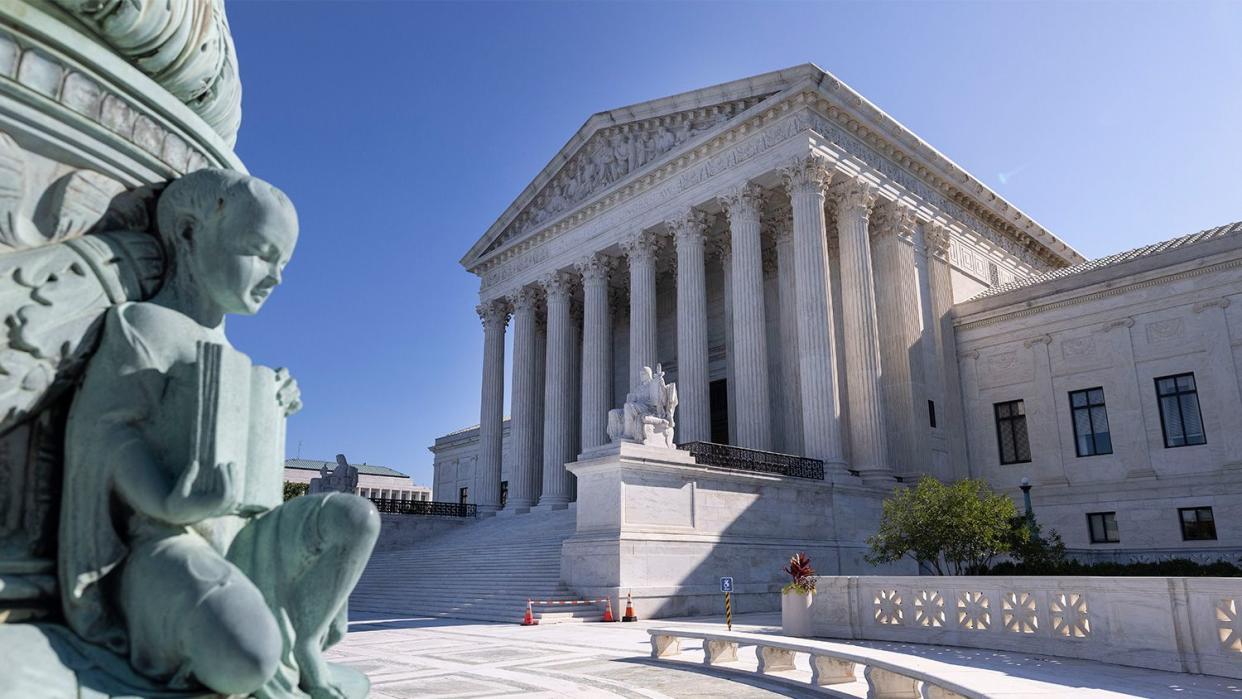Supreme Court Would Overturn Roe v. Wade According to 'Draft Opinion' Politico Said It Obtained

- Oops!Something went wrong.Please try again later.
Kevin Dietsch/Getty
The Supreme Court is set to vote to overturn the historic Roe v. Wade case that established the right to abortion according to Politico, which says it obtained a "majority draft opinion" of the decision.
The 98-page opinion, allegedly authored by Justice Samuel Alito and leaked to the press in what appears to be a major breach of confidentiality, states that "Roe was egregiously wrong from the start," and that "we [the Supreme Court majority] hold that Roe and Casey [another ruling on the right to abortion from 1992 which upheld the previous court decision] must be overruled."
The draft document, labeled as the "Opinion of the Court," also says, "It is time to heed the Constitution and return the issue of abortion to the people's elected representatives."
A decision to overturn Roe seemed likely when the conservative-leaning Supreme Court decided in December to take up a lawsuit over Mississippi's ban on abortions after 15 weeks of pregnancy. Because allowing the ban to move forward would be in violation of Roe, it raised expectations that the conservative majority on the court would vote to overturn the case. According to Politico, Justices Clarence Thomas, Neil Gorsuch, Brett Kavanaugh and Amy Coney Barrett joined Alito's opinion.
Politico also stipulated that the draft opinion does not represent an official decision from the court, which will only be codified once a final opinion is published, most likely within the next two months. Votes from Supreme Court justices can change before opinions are formally released, often days before a decision is officially made.
Until then, abortions remain a constitutional right in the United States, though several states have created bans that limit the procedure based on the gestational age of the fetus.
It is not immediately clear how Politico obtained the alleged draft opinion, which is noted to have been circulated within the high court in February. The outlet claimed that it "received a copy of the draft opinion from a person familiar with the court's proceedings" along with "other details supporting the authenticity of the document."
"No draft decision in the modern history of the court has been disclosed publicly while a case was still pending," Politico said. "The unprecedented revelation is bound to intensify the debate over what was already the most controversial case on the docket this term."
PEOPLE's request for comment from the Supreme Court was not immediately returned; Politico reported that the court declined to comment on their story.
RELATED VIDEO: Woman Whose Conception Sparked Roe v. Wade Case Breaks Silence: 'I'm Keeping a Secret but I Hate It'
The draft opinion states that the right to have an abortion would remain up to each state, though about half of states have already created laws that would ban abortion if Roe is overturned.
The potential ruling comes at a time when abortion rights are under assault across the country. In 2021, a record 106 restrictions on abortions became law in the U.S.
In the past, states that tried to enact anti-abortion laws knew they would be struck down by state and federal courts following the precedent set by Roe v. Wade. But now, with six conservative justices on the Supreme Court — three added during Donald Trump's presidency — legalized abortions may no longer be an inalienable right.
RELATED: Saturday Might Be the Last Anniversary of Roe v. Wade
The three Democratic-appointed justices — Stephen Breyer, Sonia Sotomayor and Elena Kagan — are working on one or more dissents, according to the person who spoke to Politico.
"We've entered into a new, more restrictive phase in 2021 because we now have a solidly anti-abortion Supreme Court," Elizabeth Nash, state policy analyst at the Guttmacher Institute, a research group focused on abortion rights, previously told PEOPLE. "That really signaled to state legislators that more restrictions and even bans on abortion could potentially go into effect, and we started to see state legislators moving in that direction by adopting early abortion bans."
The process of attempting to overturn Roe v. Wade began when Mississippi's ban on abortions after 15 weeks was struck down by a federal court. The state then asked the Supreme Court to either overturn Roe v. Wade or allow states to pass pre-viability abortion bans. Oral arguments were heard in December and a final decision is expected late this spring, or in early summer.
Never miss a story — sign up for PEOPLE's free weekly newsletter to get the biggest news of the week delivered to your inbox every Friday.
If Roe is overturned, "then I would expect in fairly short order we would start to see states, particularly the South, the Plains and Midwest, look to adopt abortion bans," Nash said. Twelve states, including Mississippi and Texas, have "trigger" laws in place that would automatically ban abortions if that happens.
"And that would make it very hard for a large percentage of women in the country to access abortion care in their own state. It means a lot more people would have to travel for care," Nash added. "And the people who are most impacted by these abortion restrictions and bans are people of color, low-income individuals, young people and LGBTQ individuals — people who are already burdened with insufficient access to healthcare."
However, there are efforts to maintain the right to abortion, even if Roe is overturned. Many states such as New York, Hawaii, California and Washington have statutory protections for abortion rights in their laws. And with the executive and legislative branches of the U.S. government in support of abortion rights, there are plans in the works to stop the Texas ban and create legislation like the Women's Health Protection Act, a bill currently in Congress that would prevent abortion bans and other restrictions.

